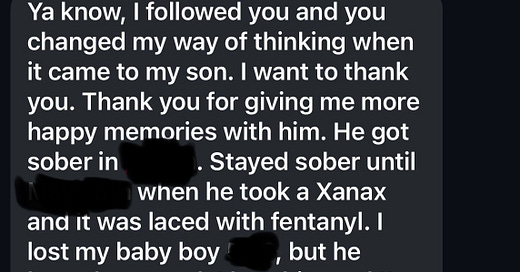"Do What You Can Live With": A Framework for Providers Who Work With Families Affected by Addiction
If you work with families navigating a loved one's addiction and you're still using the word enabling as a clinical tool, I want to offer you something different.
Do what you can live with.
It's not a slogan. It's a trauma-aware, regret-informed framework rooted in reality. One that can help families survive what may become the hardest chapter of their lives.
Because too often, families are painted as the problem:
"You're enabling."
"You're in the way of their rock bottom."
"You're standing between them and recovery."
But here's the reality: Most families already feel like the problem.
They're grieving someone who is still alive.
They're loving someone who is self-destructing.
They're being told that loving their child is part of what’s killing them.
We’ve pathologized compassion. We’ve weaponized abstinence. And in doing so, we’ve alienated the very people holding the front line.
Then I Received This Message
And it stopped me cold.
She didn't message me because her son survived. She messaged me because she didn't have to wonder if he knew she loved him. She didn't have to question if she showed up for him the way her heart needed to.
That's what "Do What You Can Live With" gives families: Not certainty. Not guarantees. But the ability to keep breathing after the worst happens-without drowning in shame.
The "Do What You Can Live With"
Framework
This isn't a soft approach. It's a grounded one.
It invites families to reflect on:
If the worst happened tomorrow, what would I regret not doing today?
What boundary can I uphold without resentment, without collapsing under guilt?
Can I love them without abandoning myself in the process?
This isn't about permissiveness. It's about peace. It doesn't soften boundaries. It makes them sustainable. It gives families agency, not ultimatums.
The Invitation to Providers
When you ask a parent to let go, detach, or
"stop enabling," ask yourself:
Are you helping them make a decision they can live with—or one they'II carry like a wound if they get that call?
Instead of:
"Is this enabling?" Try: "Will this choice let them sleep at night if their loved one doesn't make it?"
Because grief is coming for some families, no matter what we do. But shame doesn't have to be part of the equation.
This Isn't About Me.
It never has been.
It's about the mother who held her son's hand in recovery before she buried him. It's about the father who showed up at court, again, because he didn't want his last words to be silence. It's about every family who has been told they were the problem, when all they were trying to do was love someone without losing themselves. Families are desperate to be seen and I mean really seen. Families are so desperate that when a system tells them "tough love" and "rock bottom" are the solution... they complied out of absolute desperation to see their loved one come back to them.
Did any of the professionals who pushed this ever stop to consider what that asks of a mother? It demands she betray every instinct she has to protect, comfort, and fight for her child.
Let them do what they can live with. Not what we think they should tolerate. Not what our systems allow and preach. What they can live with...ethically, emotionally, and in grief.
For Clinicians, Therapists, and
Recovery Professionals:
Have you ever helped a family reframe their role? Not as enablers, but as witnesses to suffering? What tools have helped you guide them without stripping them of dignity?
Let's stop pathologizing love. Let's start offering families something they can carry, even when the outcome breaks them.





